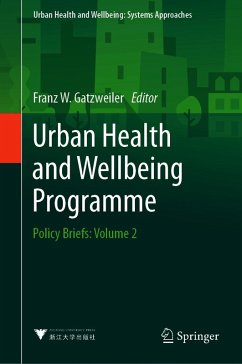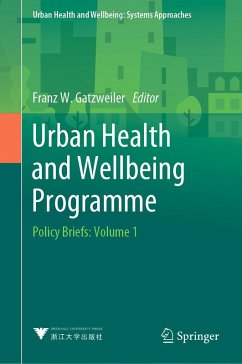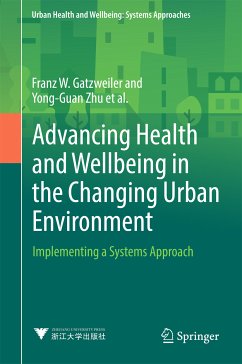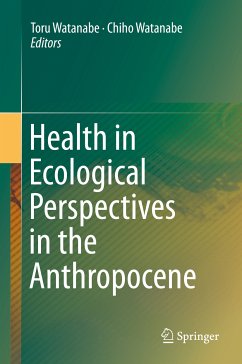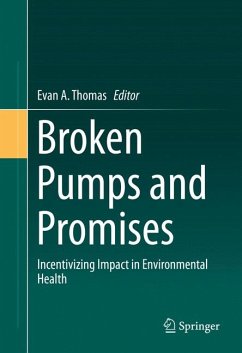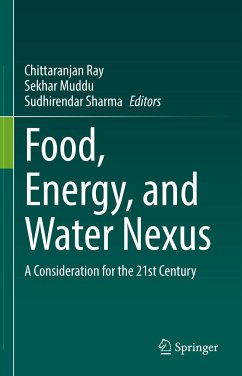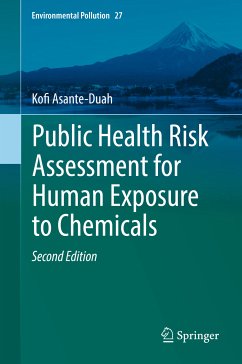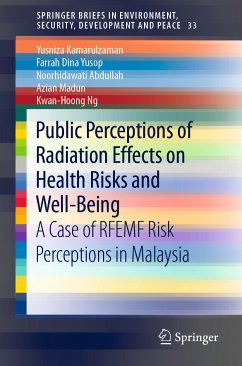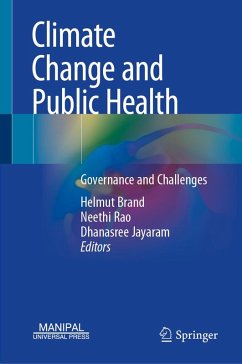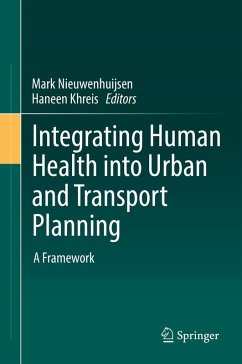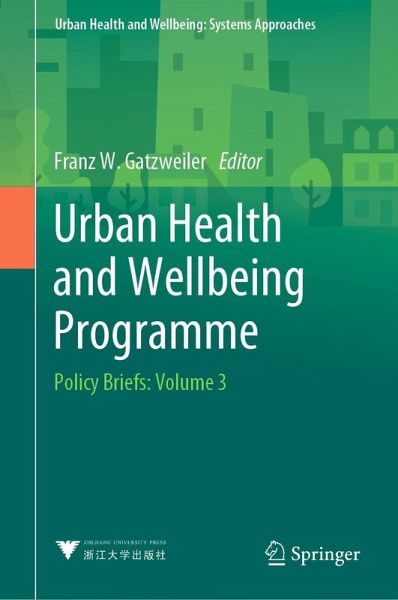
Urban Health and Wellbeing Programme (eBook, PDF)
Policy Briefs: Volume 3
Redaktion: Gatzweiler, Franz W.
Versandkostenfrei!
Sofort per Download lieferbar
72,95 €
inkl. MwSt.
Weitere Ausgaben:

PAYBACK Punkte
36 °P sammeln!
This book presents the background and context of an urban health issue, research findings, and recommendations for policy/decision-makers and action-takers.This book is a collection of policy briefs produced from research presented at the 16th Conference on Urban Health in Xiamen, China, during November 4-8, 2019, under the theme "People Oriented Urbanisation: Transforming Cities for Health and Well-Being," co-organized by the Urban Health and Wellbeing (UHWB) programme of the International Science Council (ISC), The 15th Annual Session of Global Forum on Human Settlements in Shenzhen, China, ...
This book presents the background and context of an urban health issue, research findings, and recommendations for policy/decision-makers and action-takers.
This book is a collection of policy briefs produced from research presented at the 16th Conference on Urban Health in Xiamen, China, during November 4-8, 2019, under the theme "People Oriented Urbanisation: Transforming Cities for Health and Well-Being," co-organized by the Urban Health and Wellbeing (UHWB) programme of the International Science Council (ISC), The 15th Annual Session of Global Forum on Human Settlements in Shenzhen, China, during October 15-16, 2020, and the Chinese Academy of Sciences & Technology (CAST) International Conference on "Digital economy and green development" held during November 2020.
The UHWB programme takes an interdisciplinary, cross-sectoral, and systemic view on issues of health and well-being in cities which include the urban economy and finance systems, education, employment, mobility and transport, food, energy and water resources, access to public services, urban planning, public spaces and urban green, as well as social inclusion. Contributions to this book have been made by scientists from multidisciplinary research fields.
The policy briefs in this book provide an interdisciplinary and cross-sectoral perspective on urban health and human well-being issues, primarily food security, urban infrastructure, public services, traffic and transportation, smart city building, urban health and safety, social cohesion sustainable development policies, and urban planning. In some case, it informs about urban health issues in different regions of the world, the current status, and key insights into addressing related issues, with emphasis on factual cases in the current COVID-19 pandemic.
The book is intended for citizens and political decision-makers, who are interested in systems perspectives on urban health and well-being, examples ofhow to deal with the increasing complexity of cities and the accompanying environmental and social impacts of increasing urbanization. Furthermore, it hopes to inspire decision-makers to facilitate finding solutions, in order to reach the goal of advancing global urban health and well-being.
This book is a collection of policy briefs produced from research presented at the 16th Conference on Urban Health in Xiamen, China, during November 4-8, 2019, under the theme "People Oriented Urbanisation: Transforming Cities for Health and Well-Being," co-organized by the Urban Health and Wellbeing (UHWB) programme of the International Science Council (ISC), The 15th Annual Session of Global Forum on Human Settlements in Shenzhen, China, during October 15-16, 2020, and the Chinese Academy of Sciences & Technology (CAST) International Conference on "Digital economy and green development" held during November 2020.
The UHWB programme takes an interdisciplinary, cross-sectoral, and systemic view on issues of health and well-being in cities which include the urban economy and finance systems, education, employment, mobility and transport, food, energy and water resources, access to public services, urban planning, public spaces and urban green, as well as social inclusion. Contributions to this book have been made by scientists from multidisciplinary research fields.
The policy briefs in this book provide an interdisciplinary and cross-sectoral perspective on urban health and human well-being issues, primarily food security, urban infrastructure, public services, traffic and transportation, smart city building, urban health and safety, social cohesion sustainable development policies, and urban planning. In some case, it informs about urban health issues in different regions of the world, the current status, and key insights into addressing related issues, with emphasis on factual cases in the current COVID-19 pandemic.
The book is intended for citizens and political decision-makers, who are interested in systems perspectives on urban health and well-being, examples ofhow to deal with the increasing complexity of cities and the accompanying environmental and social impacts of increasing urbanization. Furthermore, it hopes to inspire decision-makers to facilitate finding solutions, in order to reach the goal of advancing global urban health and well-being.
Dieser Download kann aus rechtlichen Gründen nur mit Rechnungsadresse in A, B, BG, CY, CZ, D, DK, EW, E, FIN, F, GR, HR, H, IRL, I, LT, L, LR, M, NL, PL, P, R, S, SLO, SK ausgeliefert werden.



